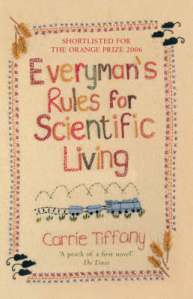 This month my book group have dug back in time, a small way, to read Carrie Tiffany’s ‘Everyman’s Rules For Scientific Living’. It was featured as part of a Waterstones best of the Orange Prize promotion. Reading the back cover it seemed to be right up my street (i.e. it was about science and featured a train). Shortlisted in 2006, I couldn’t understand how it has slipped under my radar. Now I’ve read it, it’s all too easy to see.
This month my book group have dug back in time, a small way, to read Carrie Tiffany’s ‘Everyman’s Rules For Scientific Living’. It was featured as part of a Waterstones best of the Orange Prize promotion. Reading the back cover it seemed to be right up my street (i.e. it was about science and featured a train). Shortlisted in 2006, I couldn’t understand how it has slipped under my radar. Now I’ve read it, it’s all too easy to see.
ERfSL isn’t by any means a bad book, it’s just an unremarkable one. There is little here to distinguish it from the pack of book-club worthy books. The novel is set in the Australian outback between the wars, but as a chronicler of Australian social history, Tiffany is no Kate Grenville.
The story is narrated by Jean Finnegan, a young seamstress aboard the Australian government’s ‘Better Farming’ train. At the outset, this is fascinating. I had no idea such a thing had existed. The train consisted of a number of coaches, each one devoted to a branch of rural living. So there was a poultry coach, a livestock car and even a plants and grains carriage. There was also a coach devoted to women’s roles, offering advice on sewing, cooking and midwifery. The train’s ensemble cast were an eclectic bunch of well-drawn characters and the opening sections were the novel’s strongest.
It’s when Jean disembarks that the novel becomes flat. On the train she meets soil and grain expert Robert Pettergree. There is an instant attraction and the two marry in undue haste. Jean becomes caught up in Robert’s vision, where the land bows to scientific rigour, and he revolutionises Outback farming with chemical fertilisers.
Of course things don’t work out as planned. Jean and Robert find all sorts of obstacles in their way, and each one saps a little bit of their spirit. The problem is the air of inevitability about it all. All the travails have occurred in countless novels before, making it all too easy to guess what was going to happen. The problem is exacerbated by bland characterisation. The vivid portraits drawn earlier in the novel are replaced by flat, cut-out, smalll-town stereotypes.
There are some things I liked about this book. Each year, Jean faithfully carried out a scientific grain test, which she writes up with experimental rigour. The decline in her results provide a dispassionate account of an ongoing tragedy. The reader fills in the gaps and it’s a clever device. I also liked that it was science that brought these people low. In these types of novels it is normally ardent adherence to religion that causes so many problems. Here Tiffany shows the perils of dogmatic rhetoric, no matter what stands behind it.
All in all I was underwhelmed by this novel, which promised more than it delivered. Already I am struggling to recall its details. This is not a bad book, but with so many good books out there, I find it difficult to think of reasons why you should devote time and money to this one.
One thought on “The Grain Delusion – ‘Everyman’s Rules for Scientific Living’ by Carrie Tiffany”